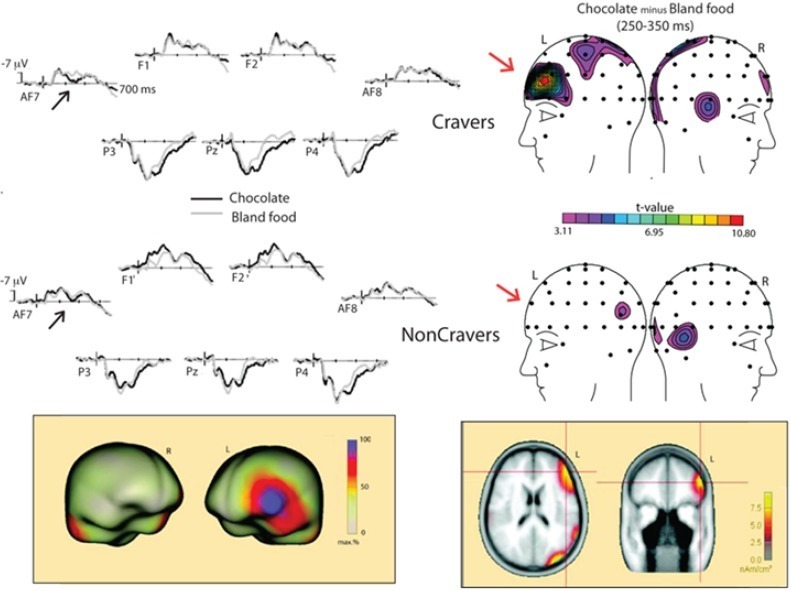Meditation’s Positive Effects on the Brain

Many people meditate every day (or at least try to). Even if we don’t, we know the general benefits associated with the practice: decreased stress, more focus, and better sleep—all the things endless yoga advertisements love to tout.1,2 However, research by a Harvard University neuroscientist has shown that meditation actually changes your brain—a truly remarkable find.3,4,5 Though it may take some time for the changes to take effect, long-term meditators have been shown to have a larger amount of gray matter in the insula and sensory regions of the brain, as well as the auditory and sensory cortex.
Since people have different sensory responses to just about every scenario, this find is quite interesting. Previously, researchers found that chocolate—the mere sight of it—impacts our brains uniquely.6,7,8 It is interesting to see that as neuroscience advances more and more, we are beginning to see large scientific trends. Healthy foods and habits tend to elicit good neurological responses, and poor habits and choices tend to impact our brains very negatively.

Environmental Epigenetics
Daily choices like meditation and diet also affect a myriad of other physiological and neurological facets.9 Though we are born with certain genetic material, our daily choices and habits can create reversible changes in our genes, known as epigenetics.10,11,12 While epigenetics helps to control whether certain genes are active or not, we still do not know what the long-term impact of these changes may be.13,14
An interesting study from 2015 found that food commercials trigger regions in the brain associated with reward processing and are correlated with body fat percentage.15 Essentially, the more food commercials you watch on TV, the more likely you are to start craving food. This is another possible reason why some of us have a hard time resisting foods that may be satisfying in the short term, but deleterious in the long term. By establishing healthier habits—like eating a Paleo diet or swapping television time for meditation—you can help improve your quality of life.
Much of the success of The Paleo Diet® stems from the fact that it actually works, with no known health risks to those who follow it correctly. Similarly, meditation also has no known risks. So if you haven’t already considered adding meditation to your routine, I would encourage you to do so. Research conducted has found long-term meditating resulted in more gray matter in the frontal cortex of the brain, which is most commonly associated with working memory and executive decision making.16,17 These two functions are important for weight loss, self-control, and our long-term health.
This is all the more reason to continue to practice daily healthy habits. While those who are more science-minded may be initially skeptical of meditation as a legitimate technique, the research is beginning to be unavoidably clear: Meditation has clear and obvious scientific benefits.18,19,20
In all likelihood, the science will prove that those who meditate, eat healthy, get lots of sleep, limit stress, and exercise daily will live longer, healthier, and better lives. Since we all want better lives, this research should be taken into serious consideration. No matter where you’re currently at health-wise, you can always do more to improve yourself.
References
[1] Edwards L. Meditation as medicine. Benefits go beyond relaxation. Adv Nurse Pract. 2003;11(5):49-52.
[2] Peng C.K., et al. Heart rate dynamics during three forms of meditation. Int. J. Cardiol. 2004;95:19–27.
[3] Available at: //www.washingtonpost.com/news/inspired-life/wp/2015/05/26/harvard-neuroscientist-meditation-not-only-reduces-stress-it-literally-changes-your-brain/. Accessed May 30, 2015.
[4] Lazar SW, Kerr CE, Wasserman RH, et al. Meditation experience is associated with increased cortical thickness. Neuroreport. 2005;16(17):1893-7.
[5] Hölzel BK, Carmody J, Vangel M, et al. Mindfulness practice leads to increases in regional brain gray matter density. Psychiatry Res. 2011;191(1):36-43.
[6] Asmaro D, Liotti M. High-caloric and chocolate stimuli processing in healthy humans: an integration of functional imaging and electrophysiological findings. Nutrients. 2014;6(1):319-41.
[7] Sokolov AN, Pavlova MA, Klosterhalfen S, Enck P. Chocolate and the brain: neurobiological impact of cocoa flavanols on cognition and behavior. Neurosci Biobehav Rev. 2013;37(10 Pt 2):2445-53.
[8] Small DM, Zatorre RJ, Dagher A, Evans AC, Jones-gotman M. Changes in brain activity related to eating chocolate: from pleasure to aversion. Brain. 2001;124(Pt 9):1720-33.
[9] Gardner B, Lally P, Wardle J. Making health habitual: the psychology of ‘habit-formation’ and general practice. Br J Gen Pract. 2012;62(605):664-6.
[10] Weinhold B. Epigenetics: the science of change. Environ Health Perspect. 2006;114(3):A160-7.
[11] Egger G, Liang G, Aparicio A, Jones PA. Epigenetics in human disease and prospects for epigenetic therapy. Nature. 2004;429(6990):457-63.
[12] Portela A, Esteller M. Epigenetic modifications and human disease. Nat Biotechnol. 2010;28(10):1057-68.
[13] Delcuve GP, Rastegar M, Davie JR. Epigenetic control. J Cell Physiol. 2009;219(2):243-50.
[14] Baccarelli A, Bollati V. Epigenetics and environmental chemicals. Curr Opin Pediatr. 2009;21(2):243-51.
[15] K. M. Rapuano, J. F. Huckins, J. D. Sargent, T. F. Heatherton, W. M. Kelley. Individual Differences in Reward and Somatosensory-Motor Brain Regions Correlate with Adiposity in Adolescents. Cerebral Cortex, 2015
[16] Buckner RL, Kelley WM, Petersen SE. Frontal cortex contributes to human memory formation. Nat Neurosci. 1999;2(4):311-4.
[17] Volkow ND, Fowler JS, Wang GJ, Goldstein RZ. Role of dopamine, the frontal cortex and memory circuits in drug addiction: insight from imaging studies. Neurobiol Learn Mem. 2002;78(3):610-24.
[18] Goyal M, Singh S, Sibinga EM, et al. Meditation programs for psychological stress and well-being: a systematic review and meta-analysis. JAMA Intern Med. 2014;174(3):357-68.
[19] Jain S, Shapiro SL, Swanick S, et al. A randomized controlled trial of mindfulness meditation versus relaxation training: effects on distress, positive states of mind, rumination, and distraction. Ann Behav Med. 2007;33(1):11-21.
[20] Singh Y, Sharma R, Talwar A. Immediate and long-term effects of meditation on acute stress reactivity, cognitive functions, and intelligence. Altern Ther Health Med. 2012;18(6):46-53.




